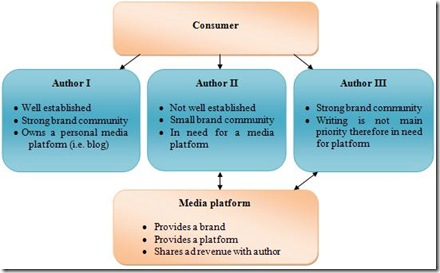I was just reading this great post by Robin Carey , the co-founder of Social Media Today, about the maturity of social media and the challenges it faces on the way. One of the main challenges for the businesses is monetization of social media. I completely agree with the thought that “Information does want to be free, free to move around at any rate, even if we’ll increasingly seeing value put on that information in various ways”, and who can evaluate or put the value on the content best? The Consumer. The recent news about News Corp plans to monetize the content again, it kind of reminds me this video of Prosumer, where corporations are trying to control the free movement of the content but at the end they loose the battle. Do not get me wrong I am not against paying for the content, but sometimes I don’t understand why can’t I pay for my favorite blogger or journalist directly? I think that’s about to change. I believe that “freemium” business model and payment systems will have to evolve to become more flexible and provide more choices for the consumer. I can easily imagine the media platform (i.e. Social Media Today) where I come to read the news and with a click of some sort of social “pay me” button I could pay for the good quality post and support my favorite blogger/journalist directly without any intermediaries by donating 10-50 p for the post. The emergence of such function could massively improve the social media content quality as there would be kind of “natural selection” in social media because people would be motivated to build up their personal brands by creating valuable content (monetary motivation always helps). Furthermore, the media brands would be interested to attract good journalist/bloggers to maintain their brands who in return would be willing to share their revenue stream with the company because big brands attract more visitors. The more I think about the more clear it gets , that such kind of system could be a game changer and a win-win situation for everyone . What do you think about it?
Archive | Consumer Behavior
Challenging the old media business models (Part 1)
Posted on 18 January 2010.
Posted in Consumer Behavior, TrendsComments Off on Challenging the old media business models (Part 1)
Challenging the old media business models (Part 2)
Posted on 27 January 2010.
As a follow up to the recent post “Challenging the Old Media Business Models” I want to get a bit deeper into the analysis of media business (revenue) models. There are quite a few them which come in different classifications and structures, but i find organized by Paul Bradshaw most suitable to discuss the subject, mainly because it is very clear, informative and well structured.
Most of these models like advertising, affiliates, premium (“velvet rope”) services have been tried and work pretty well under certain circumstance , but “Social value” model hasn’t been explored that much or hasn’t been considered as a valuable enough on its own. According to Paul Bradshaw , “Social value” model revenue is generated through social interaction by brand community (in the form of donations, support or spin-off).Actually it is often dismissed as very mystified and unclear , because social value is quite difficult to measure. But the times are changing. I think with social media going mainstream, personal branding growing bigger and bigger and evolving monetary systems online – “social value” model can be the next big thing. I was thinking about it for a while and after short brainstorm came up with this:
Consumer pays directly to author.
Social media is all about disintermediation. Therefore, it is is quite a straight forward model, but if developed it would present a real shift in consumer’s perception – paying for the content when you don’t have to ? Madness? No! It would be all about the social status and personal brand building!
It could be very attractive idea for bloggers who already have well established personal brands and maintain their own platforms. In order to implement this model the author would have to provide superior social platform where the relationship building with the community would have to be considered as main priority. According to Paul Bradshaw people never paid for ‘content’; they paid for a package and a service that included content – “They bought a newspaper (brand), not ‘the news.” In this case the newspaper would be a personal brand which would have to provide best social engagement possible. The personal branding would have to work both ways – not only author would have to get paid for well developed brand and top content, but consumer would have to receive some social points back as well. Lets say consumer could leave his name and contact details on the contributors list or virtual good system could tweet automatically that a person just made a reward or donation. Also, this model could work really great in B2B environment as the parties are much more aware about mutual benefits of marketing and social interaction .
Consumer pays author – author pays media platform.
Author sharing revenue with the media company – basically paying money for the platform to speak (or to be heard).It may sound ridiculous, but this model could be very attractive for less established writers who has interesting ideas but have no strong background to support them or have no capabilities/resources to build their own platforms.
In order to implement this model the two conditions would have to be present – strong media brand and qualified but now well known writer. Young writers would be interested to have their material published on big platform for greater audience in return sharing their revenue with the media platform. Furthermore, the media platforms would be interested to maintain their brands and attract good journalist/bloggers because of advertising dollars they would bring – specialized and engaged communities created under big brand could be well targeted.
The outcome.
If these models are implemented the outcome would be quite dificult to predict. It’s clear though, that the personal branding and community building would gain major importance in the media strategy. The content would improve and there would be less “noise” in media in the long term, because of “natural selection” process. The big media brands could concentrate on their core capabilities managing the talents rather that content production itself. Who knows maybe one day we will have our X-Factor of media? “In my dreams I have a plan If I got me a wealthy man I wouldn’t have to work at all, I’d fool around and have a ball”. – and that would be the song to sing for the audition, just the wealthy man would be the authors who bring wealth with the valuable content and community. But most importantly consumer would get to be a king, it would be able to influence, participate and gain from the process .
So what do you think about it? Please share your thoughts whatever they may be and submit your answer to a quick poll:
Here is the list of top articles and presentations analyzing the new media business models:
Making money from journalism: new media business models (by http://onlinejournalismblog.com)
What does the “Media Business Model” mean? (by http://www.longtail.com)
The Freemium Business Model: Anything There for the Media? (by http://rebuildingmedia.corante.com)
Posted in Consumer Behavior, TrendsComments (4)
Brand influence vs Consumer influence – Who will win the fight?
Posted on 15 February 2010.
The power of the consumers in social media can be deceiving. According to Taylor Ellwood’s recent post, only consumers with the large lists of followers can be actually influential. It is realy straight forward and natural assumption, but it presents quite and interesting opportunity for the brands working in social media. Why? Brands and people related to big brands (Bill Gates, Steve Jobs, Seth Godin) usually attract the biggest crowds of followers on social media properties. These social accounts has indisputably greater social influence than normal personal accounts. As a result they can be used as and opposition to consumer power (sometimes anarchy) on the social networks or other social media properties. .
Social Brands Network
Is it possible that brands will connect to networks in order to help each other to face growing consumers power on social networks? Yes, it is. I love the idea of the consumer empowerment by social media, actually this blog is all about that, but I think there has to be a balance in communication power between brand and consumer. The unintentional silly mistakes by brands (i.e Vodafone) can not be exaggerated by consumers to that level it sometimes is and should have an opportunity to be managed better. The appearance of strategic partnerships between brands could be one of the ways to solve this problem. Let me first define what I call the Social Brands Network: Read the full story
Posted in Consumer Behavior, Personal Branding, TrendsComments Off on Brand influence vs Consumer influence – Who will win the fight?
How to start and manage your community
Posted on 02 April 2010.
Just wanted to share this short brilliant talk about leadership and community management by Dere Sivers. A few lessons to learn for the community managers:
- You have to make it easy for people to follow you
- You have to become “equal” with people who follow you and know how to transfer the sentiment.
- You have to remember that followers attract more followers – not the leader.
I hope you enjoyed this video and have a great Easter everyone!
Posted in Community Management, Consumer Behavior, How ToComments (2)
Is Social Media Damaging Our Social Skills?
Posted on 16 June 2010.
I’ve just read this article on Telegraph where the research suggests that “Mobile phones and social media are stealing our manners” and “damaging our social skills“. I think it’s nonsense.
Since the old days people used to express themselves more in writing than in any other form of communications. I don’t think it’s a confidence issue . In fact, i think it’s to do with politeness for some reason we as a society don’t find it so rude if someone writes bad about us compare to when someone says something bad.
People are so much more open and personal in writing, perhaps due to the fact, that they have more time to think what they put down on the paper and are not so impulsive. When you think about how many times you regretted about something you had said, I bet that there were 100 times less when you regretted about something you had written. Therefore, I think it’s even more real to me, what people write than what people say, because they always have chance to correct themselves and transfer their real emotion.
It is actually a paradox that we tend to say more in writing than when we speak, but actually I think it’s to do with all this political correctness and sometimes unnecessary politeness which limits people expression.
Is it a social disaster or social development, I don’t know? But living in the world of the fake smiles, I kind of enjoy straight forward language on social media sites. What about you?
Posted in Consumer BehaviorComments Off on Is Social Media Damaging Our Social Skills?
Are you here to make friends?
Posted on 01 July 2010.
I’ve just read this brilliant quite personal story by Peter Bregman on Harvard Business Review “Why Friends Matter at Work and in Life“ . The author analyzes a few interesting researches how friendships affect your business and everyday life. I love the authors points taken out of the research:
- If you’re looking for a job you’d better have friends. The number-one way people find new jobs is referrals by friends.
- Once you’re on the job, having a best friend at work is a strong predictor of success.
- Friendships in high school were a strong predictor of increased wages in adulthood — to the tune of 2% per person who considered you a close friend.
- Want to stay in that job you have? Then you’d better have friends.
In my opinion the real friendships are of vital importance factor in Social Media and community building. I know that this topic of friendship has been discussed over and over again but there is a big difference in having “fans” and having at least a few very good “friends” in the community you are building, mainly because of there reasons indentified by Peter :
- Friends can refer your business to their friends
- Friends can stand up for your business and brand values and send the right message to their friends
- Friends can help to grow your business by heavily engaging in your social media activities (commenting, sharing and etc.)
So are you here to make friends?
Posted in Community Management, Consumer Behavior, Personal BrandingComments Off on Are you here to make friends?
Who Are the Social Media Citizens?
Posted on 07 December 2010.
 I’ve been conducting interviews with Social Media Citizens for a last couple months in order to understand better what social media means for different people working in different parts of the world in different sides of the industry and before moving on to the new series with updated question I want to take some time off to analyse a few answers. So this week there are no interviews – just plain analysis.
I’ve been conducting interviews with Social Media Citizens for a last couple months in order to understand better what social media means for different people working in different parts of the world in different sides of the industry and before moving on to the new series with updated question I want to take some time off to analyse a few answers. So this week there are no interviews – just plain analysis.
Who Are the Social Media Citizens?
I thought that there is no greater way to define this term than to hear the opinion of the top social media influencers about it. And that’s what they had to say:
-
“We are all citizens of the world of social media. Whether implicitly or explicitly, our mediated lives have changed and whether or not you are an active participant in social media channels, you are in fact, a participant. – Adam Broitman
-
A Social Media Citizen is an open minded individual looking to engage and collaborate across the digital sphere. They will give more than they take and always look to develop themselves and their relationships. – Chris Hall
-
‘Someone who contributes to the value of the Social Media space.’ This is really more to do with the nature of the social objects they share in the space rather than the connections they have. – Richard Sedley
Posted in Consumer BehaviorComments Off on Who Are the Social Media Citizens?
Why You Should Think Before You Type
Posted on 23 February 2011.
Now, these instances happen in real time, where the interaction is not documented (unless there is a hidden camera at the water cooler). So if you make a mistake, you can apologize and smooth out the situation. Many times you can even improve on a poor first impression.
But when it comes to online interactions, it isn’t as simple. Your words last forever and can be seen by millions.
There have been many high profile stories in the news about everything from children finding out about their parents’ divorce by reading their mother’s Facebook profile (yes, real story) to job seekers losing their opportunity based on the negative things they “tweeted” about their interview on Twitter. So the first points to consider are to not only think before you write, but also make sure that what you are writing you don’t mind everyone seeing.
When choosing to interact with others online, you are in a way “going public” with your profile and building your (online) reputation. Yep, even if you are playing on Facebook your online footprint is being documented. That being said, when it comes to interacting and marketing online, your reputation is the most important thing in the world. And this reputation goes further than your profile page or online resume/CV. What your online reputation consists of is everything you write, every interaction, ever message you send, ever person you connect with. Your reputation will fuel what people say and think about you, with many of these opinions never being shared with you.
As your reputation is built around interaction, let’s talk about something to be weary of – negativity. Every person you interact with online is part of your virtual community. So whether they are directly connected with you or not, you share common contacts and associations (many of which can be unbeknownst to you). So it is important to be mindful of your words.
Let’s take Linkedin for example. When you go into your favorite group, read through the latest discussions, you find one that peaks your interest. You click through, read the article and when you are halfway through discover that you completely disagree with the points being shared. They are totally wrong! Why? Because in your experience this is not true. Great! That’s what Linkedin discussions are all about, sharing different points-of-view, insights and experiences. Who knows, your point could change the point-of-view of the person posting the discussion. Your information is pretty powerful.
But, how do you make your point? Remember, Linkedin is a professional site. Do you insult the person? Speak in a condescending tone? Send them a private message telling them that they are silly and way off point?
If this sounds like you, please be careful with what you write (and this goes for all of the other social sites as well)!
When you want to share your point-0f-view, do it in a productive professional manner. Remembering that this is a public forum, watch your words. If you don’t agree, don’t just say that. Make a case, share your wisdom and experience. By engaging with others (especially if the person you are interacting with has a large following) you have a prime opportunity to grow your own online visibility. The point is that you want to build your reputation, not tarnish it.
Being consistently negative can result in word of your behavior spreading, people will discuss it, you may be ignored and more. The worst part? Many times you won’t even know it is happening until its too late.
If someone irritates you, ignore them or remove them as a connection. This constant refinement will also help you get the most out of your time online. Sending them a message telling them you don’t like them is not the answer. And guess what? Sometimes these “hate mails” get forwarded, shared and discussed. Again, this activity is something that you won’t know is occurring.
Now don’t get me wrong, I’m not saying you shouldn’t have your say. Opinions are crucial in the social media space. My point is to make your contributions online productive and aligned with your professional acumen. This will help you build a strong, credible profile and help your business grow. Being negative and antagonistic isn’t the answer.
With that said, many of the so-called social media rules are not new, groundbreaking or even shocking. They are based on the fundamentals of communication and interaction. So whether you are using the online media for personal or business reasons, treat others as you would like to be treated.
So what do you think? Have you come up against this while online and how have you dealt with it?
Posted in Consumer Behavior, How To, Personal Branding, ToolsComments Off on Why You Should Think Before You Type
Are Your Customers Trying to Find Your Business on Their Phones: 5 Facts That You Should Know
Posted on 24 April 2011.
There has been a lot of talk about the power of mobile marketing. From text marketing to applications, the market is abuzz with the “power of mobile.”
 For some businesses it seems like a perfect fit, while other companies struggle to see the value of implementing a mobile marketing strategy.
For some businesses it seems like a perfect fit, while other companies struggle to see the value of implementing a mobile marketing strategy.
That’s why when I read a great article in Entrepreneur Magazine that had some information consumers use of mobile phone, I thought I would share it with you. The article was based on the findings of a recent research study done by Harris Interactive. I’ve grabbed 5 highlights to share with you here:
81% of users say then when they are searching for information on their phones, they want it right away while 66% say they want answers to questions at times when they are not in front or have access to a computer.
When it comes to opinions, 40% of smartphone users say that they’re more by users’ opinions give within the last 24 hours than by those expressed 30 days ago. When it comes to the 18-24 age group, this number jumps to 67%.
55% of those polled were interested in searching for local reviews on their mobile phones.
63% reported the current opinion of the crowd was extremely important when choosing a destination while 40% of smartphone users wanted to find out what was happening when they saw the crowd.
Now this one is not too surprising (I actually find myself doing this). Over 1/3 of smartphone users need to find information when they are driving, when many states this is illegal.
What this information illustrates is that we shouldn’t ignore mobile marketing. With more and more people becoming reliant on their smartphones, it is presenting businesses with yet another opportunity to get in front of their target market. Worth looking into I think.
Posted in Consumer Behavior, Tools, TrendsComments Off on Are Your Customers Trying to Find Your Business on Their Phones: 5 Facts That You Should Know
The Digital World Is The Real World
Posted on 07 June 2011.
Ok probably it’s not only about social media, but digital world in general. I just get sick and tired of people comparing online and offline worlds as completely two different entities. Now listen carefully there is no two worlds, there is one world and it’s called the planet Earth. Internet is not a world on its own it just technological extension of our normal lives. I just can’t believe that in over 20 years of adoption, we still can’t figure it out. “You” online is not a different “You” – it’s the same person just in different environment. Your actions come not from some weird guy by the computer, they are done by you, so don’t try to tell me that there is someone else responsible for your actions online. That’s my view about privacy.
The irritation about products and services online – lets face that quite a few digital services became a big part of our lives, we like to shop on the internet , we like search via internet, we like to chat on the internet. Ok maybe these are not commodities, but well let’s be honest with ourselves we use them everyday like bread and butter, so why should we classify them as being different and from another world? There is a lot of buzz going on about online currencies, social commerce, augmented reality and how they will change our world. And what I don’t really like that people still asking the wrong questions – “Do we need it?” instead of “How to adopt it?”. Ok I have to agree, that probably it doesn’t apply to everything what’s digital, as there is plenty of rubbish out there, so you have to question some of the new inventions, but there is plenty of Chinese toys out there as well..(sorry about Chinese comment, I don’t really judge the people by the country they are from). So just let them be and time will show if we can put these new inventions to work for us.
Recently, I followed the interesting discussion on Trey Pennington’s Facebook Wall about this Guardian article which depicts Social Media as evil in people’s relationships and it just makes me cry when some very clever people like the author of the article (Paul Harris) still can’t get it. Why we are still researching the comparison between so called online and offline worlds when it’s clearly both which influence us and it’s completely overlapping so much, that results just can be right.
Ok now about people being different online and offline – so let’s face it like mentioned in the begging of this rant, they are not different people, they are just people in the different environment. I don’t really care if they are better or worse in that environment, maybe its a problem of our society that we cannot accept that some people are just better in online world that in the “real world”. Personally, I don’t care, if I like the person it means I like the person and not the environment we communicate in.
From the marketing perspective, I think marketers have to think carefully before simply dividing people in these two segments as the buying habits are of course different between online and offline shops, but the reasons why people are buying is still the same and personally I believe this fact is a bit more important than the environment they are performing the action.
So what’s your opinion about these two different worlds?
Posted in Consumer BehaviorComments Off on The Digital World Is The Real World




![social-media-marketing[1] social-media-marketing[1]](http://www.smcitizens.com/wp-content/uploads/2010/06/socialmediamarketing1_thumb.jpg)








Recent Comments